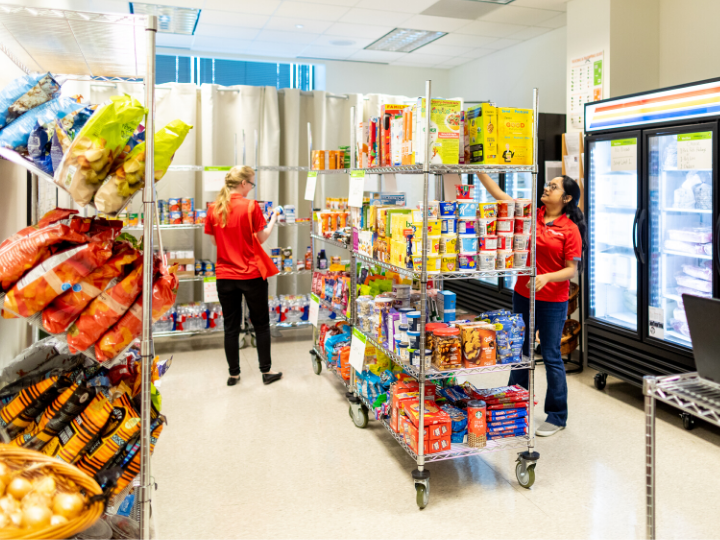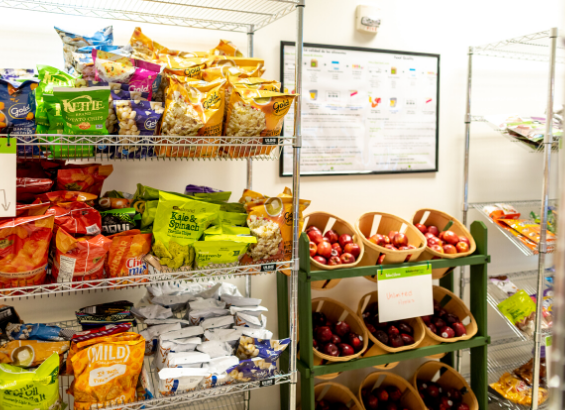


College students have enough to worry about — paying for textbooks, tuition, transportation and supplies. For many, those expenses take precedence over food. Food insecurity, or the inability to afford enough nutritious food to fuel a regularly healthy lifestyle, is a growing concern on college campuses nationwide.
In an effort to address this significant barrier to student success, the University of Houston has opened the Cougar Cupboard in partnership with the Houston Food Bank’s Food for Change market network. The cupboard is available to all enrolled undergraduate or graduate students who may need access to additional food.
“Food insecurity is associated with reduced academic performance and lower rates of degree completion. At UH, we believe sharp minds are powered by healthy bodies,” said Richard Walker, UH vice president for student affairs & enrollment services. “We are committed to supporting not only the academic needs of our students, but even their most basic needs, including proper nutrition for those who are struggling.”
Cougar Cupboard is located on the first floor of the Campus Recreation and Wellness Center in UH Wellness, suite 1038 (4500 University Dr.) and is stocked full of fresh fruits and vegetables, frozen and refrigerated foods, and dry goods. Students can receive up to 30 lbs. of free groceries every week from Cougar Cupboard or one of the other 14 Food for Change markets in Houston.
To utilize Cougar Cupboard, a student must attend a one-time market orientation hosted by Cougar Cupboard staff and complete a short application for the Houston Food Bank’s Food Scholarship Program. Market orientation sessions will be held weekly every Tuesday at 2 p.m. and Wednesdays at 11 a.m. in the UH Wellness classroom.
“We get deliveries from the Houston Food Bank every week, so our shelves will be consistently stocked and available to students on a first come, first served basis,” said Reuben Parrish, assistant director for health education at UH Wellness. “It’s our hope that by eliminating the barrier to healthy food options, our students will thrive in the classroom.”
While statistics on food insecure college students can vary greatly, the Center for Law and Social Policy estimated that between 20% to 33% of students at four-year colleges experience food insecurity. Jessica, a UH junior double-majoring in history and applied linguistics, knows how it feels to pass up meals when money is tight.
“My family has been struggling financially for over a year, so I don’t always feel comfortable paying for food when I’m on campus. You kind of get used to being hungry. It became the norm for me for a while,” she said. “I’m so thrilled UH is opening this market as a resource because I know I’m not alone.”
During the spring 2020 semester, the market will be open Monday and Wednesday from 2-6 p.m., and Tuesday and Friday from 9 a.m. - 1 p.m. It is closed on Thursday, Saturday and Sunday.
“The Houston Food Bank strives to create partnerships that have the most impact in the community,” says Regi Young, senior director of strategic partnerships, Houston Food Bank. “We provide food for better lives, which helps students to stay engaged and focused making the most of the academic excellence that University of Houston provides.”
Cougar Cupboard is the second free food pantry on campus. PEEPS Pantry is operated by the College of Education in Farish Hall and is supported by direct donations and volunteers.
Also just launched, the CoogsCARE website offers a wealth of on-campus and off-campus resources for students experiencing an unexpected or unforeseen expense, event or circumstance. From food and housing assistance, financial options and health resources to safety, academics and transportation, the website is a collection of resources to help provide support when students face unexpected situations that threaten their pursuit of earning a degree.